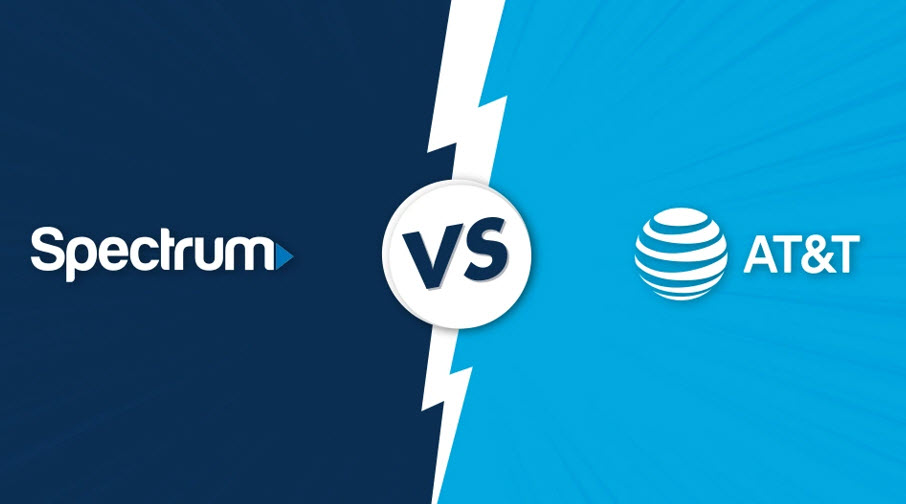Choosing the right internet and TV provider can be a daunting task. With so many options available, it’s important to compare features, pricing, and overall value to find the best fit for your needs. In this comprehensive guide, we’ll dive deep into the AT&T vs Spectrum debate, analyzing their internet, TV, and bundle offerings to help you make an informed decision.
Internet Service: AT&T vs Spectrum

Both AT&T and Spectrum are major players in the internet service market, offering a variety of plans with different speeds and prices. However, their underlying technologies and network infrastructure differ significantly, which can impact your online experience.
AT&T Internet
AT&T offers three main types of internet service:
- Fiber: AT&T Fiber boasts impressive speeds, ranging from 300 Mbps to 5 Gbps, with symmetrical upload and download speeds. This makes it ideal for data-intensive tasks like gaming, video conferencing, and large file transfers. However, fiber availability is limited to select areas.
- DSL: DSL is a more widely available option, but it generally offers slower speeds than fiber, ranging from 10 Mbps to 100 Mbps.
- Fixed Wireless: This option uses cellular technology to deliver internet service, making it suitable for rural areas where fiber or DSL may not be available. However, speeds can be inconsistent and affected by factors like weather and network congestion.
Spectrum Internet
Spectrum primarily relies on cable internet technology, offering speeds ranging from 300 Mbps to 1 Gbps. While cable internet generally doesn’t offer the symmetrical speeds of fiber, it’s widely available and provides reliable performance for most users.
Key Differences:
- Speed: AT&T Fiber offers the fastest speeds, but its availability is limited. Spectrum’s cable internet provides good speeds and wider coverage.
- Data Caps: AT&T imposes data caps on some of its plans, while Spectrum offers unlimited data on all plans.
- Contracts: AT&T may require contracts for certain plans, while Spectrum generally offers no-contract options.
TV Service: AT&T vs Spectrum
Both providers offer a variety of TV packages with different channel lineups and features.
AT&T TV
AT&T TV is an IPTV service that delivers television channels over the internet. It offers various packages with different channel counts and includes features like cloud DVR and access to streaming apps.
Spectrum TV
Spectrum TV is a traditional cable TV service that delivers channels through coaxial cables. It offers a variety of packages with different channel lineups and includes features like DVR service and on-demand content.
Key Differences:
- Technology: AT&T TV uses internet-based delivery, while Spectrum TV relies on cable infrastructure.
- Channel Lineup: Both providers offer similar channel lineups, but specific channels may vary depending on your location and package.
- DVR: AT&T TV offers cloud DVR with more storage space, while Spectrum TV provides traditional DVR with limited storage.
Bundles: AT&T vs Spectrum
Both AT&T and Spectrum offer bundles that combine internet and TV service at a discounted price.
AT&T Bundles
AT&T bundles typically combine AT&T Fiber or DSL internet with AT&T TV, offering various speed and channel options.
Spectrum Bundles
Spectrum bundles combine Spectrum Internet with Spectrum TV, offering different speed and channel packages to suit various needs.
Key Differences:
- Pricing: Bundle pricing varies depending on the chosen internet speed and TV package. Compare the overall value and included features to find the best deal.
- Contract Terms: Pay attention to contract terms and early termination fees when considering bundles.
AT&T vs Spectrum: Pros and Cons
AT&T
Pros:
- Fast fiber internet speeds in select areas
- No data caps on fiber plans
- Cloud DVR with ample storage
Cons:
- Limited fiber availability
- Data caps on some DSL plans
- Potential contracts and early termination fees
Spectrum
Pros:
- Wide availability of cable internet
- Unlimited data on all plans
- No-contract options
Cons:
- Slower speeds compared to AT&T Fiber
- Limited DVR storage
- Potential price increases after promotional periods
Factors to Consider When Choosing Between AT&T vs Spectrum
- Availability: Check the availability of AT&T Fiber and Spectrum Internet in your area.
- Speed: Determine your desired internet speed based on your online activities and the number of connected devices.
- Data Usage: Consider your monthly data consumption and whether data caps are a concern.
- TV Needs: Evaluate your TV viewing habits and desired channel lineup.
- Budget: Compare the overall cost of internet, TV, and bundle options, considering promotional periods and potential price increases.
- Customer Service: Research customer satisfaction ratings and reviews for both providers.
AT&T vs Spectrum: Making the Right Choice
Ultimately, the best choice between AT&T vs Spectrum depends on your individual needs and priorities. If you prioritize speed and have access to AT&T Fiber, it might be the better option. However, if you need wider availability and unlimited data, Spectrum could be the more suitable choice. Carefully consider the factors outlined in this guide, compare plans and pricing, and read customer reviews to make an informed decision that meets your connectivity and entertainment needs.